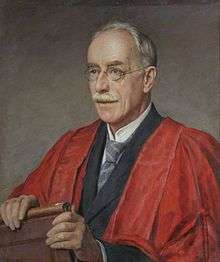Arthur Bernard Cook

Painting of Cook by Arthur Trevor Haddon, 1933
Arthur Bernard Cook (22 October 1868, Hampstead – 26 April 1952, Cambridge) was a British classical scholar, known for work in archaeology and the history of religions. He is best known for his three-part work Zeus: A Study in Ancient Religion. Cook is often considered one of the Cambridge Ritualists, and although he did not produce theoretical works, he has been called "perhaps the most typical disciple" of J. G. Frazer.[1] His poem Windsor Castle won the Chancellor's Gold Medal for poetry at Cambridge.
From 1892-1907 he was professor of Greek at Bedford College, London. He became Laurence Professor of Classical Archaeology at the University of Cambridge in 1931, where he had held a position as Reader from 1908.
Works
- The Metaphysical Basis of Plato's Ethics (1895)
- Zeus. A Study In Ancient Religion. (1914-1925)
- Volume 1: Zeus, God of the Bright Sky, Biblo-Moser, June 1, 1964, ISBN 0-8196-0148-9 (reprint)
- Volume 2: Zeus, God of the Dark Sky (Thunder and Lightning), Biblo-Moser, June 1, 1964, ISBN 0-8196-0156-X
- Volume 3: Zeus, God of the Dark Sky (earthquakes, clouds, wind, dew, rain, meteorites)
References
- ↑ Lowell Edmonds, Approaches to Greek Myth (Johns Hopkins University Press, 1990), p. 72.
External links
| Academic offices | ||
|---|---|---|
| Preceded by New position |
Laurence Professor of Classical Archaeology Cambridge University 1931 - 1934 |
Succeeded by Alan John Bayard Wace |
|
This article is issued from Wikipedia - version of the Monday, February 15, 2016. The text is available under the Creative Commons Attribution/Share Alike but additional terms may apply for the media files.